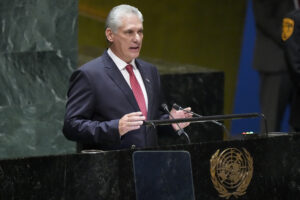Will Flight 17 Sober Us Up?
American politics was trundling along on its usual unserious and trivial trajectory when news of the crash of Malaysia Airlines Flight 17 in Ukraine shook the world. Suddenly, the stakes in public life and foreign policy were very high. People place flowers at the Dutch Embassy in Kiev, Ukraine, after a Malaysia Airlines' Boeing 777 originating in Amsterdam crashed in Eastern Ukraine. katatonia82 / Shutterstock.com
People place flowers at the Dutch Embassy in Kiev, Ukraine, after a Malaysia Airlines' Boeing 777 originating in Amsterdam crashed in Eastern Ukraine. katatonia82 / Shutterstock.com
People place flowers at the Dutch Embassy in Kiev, Ukraine, after a Malaysia Airlines’ Boeing 777 originating in Amsterdam crashed in Eastern Ukraine. katatonia82 / Shutterstock.com
Tragedies concentrate the mind.
American politics was trundling along on its usual unserious and trivial trajectory when news of the crash of Malaysia Airlines Flight 17 in Ukraine shook the world. Suddenly, the stakes in public life and foreign policy were very high.
Vladimir Putin’s recklessness in Ukraine was no longer just about his quest for regional hegemony. Miscalculation and thoughtless error have often sown chaos in the relationships among nations. The deaths of 298 innocent people exposed the dangers of the Putin Doctrine and transformed the battle for Ukraine, as President Obama said, into a global issue.
Western Europe has been trying to have it both ways with Putin. Its reluctance to go all in against him is understandable enough, given Europe’s dependence on Russian energy. Pragmatists worry that more forceful sanctions could endanger the recovery from the Great Recession.
But when Flight 17 was shot down, pragmatism took on a new meaning. It is not in any way practical to have pro-Russian rebels in Eastern Ukraine who seem to have a shoot-first-ask-questions later attitude armed with Russian missiles that can take down civilian airliners.
Europe cannot hang back anymore, and Carl Bildt, the Swedish foreign minister, suggested as much in a Financial Times article. He called on Russia “to stop its propaganda campaign, end its extensive support of the separatists and accept that Ukraine is an independent, sovereign European country.”
It’s an agenda that ought to bring the United States and Europe together. But will it bring Americans together? The horror has been widely described as “a wake-up call.” It’s not yet clear if our dysfunctional, foolishly partisan and petty political system will even pick up the phone.
Partisanship — defined as vigorous, principled disagreement — has an honored place in democracy. We are in the midst of such a debate over foreign policy in both parties. The recent GOP op-ed brawl between Gov. Rick Perry of Texas and Sen. Rand Paul of Kentucky over Iraq and America’s world role is a sign of things to come.
That’s good. What’s not good is the habit of Obama’s foes to make every foreign policy crisis about him, whether it is or not. At the beginning of the Ukraine crisis, some Republicans compared Obama unfavorably to Putin. (“He makes a decision and he executes it, quickly,” an admiring Rudy Giuliani said of the Russian dictator.) The sound-bite driven obsession with Benghazi is the apotheosis of unseriousness.
Might the events in Ukraine remind both parties of how high the stakes are? There are differences over how quickly we should act and how much we should do unilaterally. But are those differences so great as to justify statements such as Sen. Lindsey Graham’s on “Meet the Press” Sunday that Obama is “the king of indecision”?
“He’s trying to be thoughtful,” Graham said. “It comes off as weakness.”
But is it actually weakness? On the same show, Secretary of State John Kerry could hardly have been tougher in declaring that we are at “a moment of truth for Mr. Putin and for Russia.” Obama has been ratcheting up sanctions and pushing Europe toward a tougher stance.
These are differences of degree, not kind, and we might approach the need to force Putin back as an experiment with constructive engagement across party lines. In the process, we could show the world that not everything in our political discourse is defined by how a sound bite will play with the Fox News audience.
Obama, for his part, should reflect on what he needs to do to dispel criticisms like Graham’s, even if he would insist that they are unfair. Obama has been right to insist on the limits to what the United States can achieve in the world through direct military intervention. It’s a view more similar to Ronald Reagan’s than we allow. We forget that the Gipper’s more hawkish supporters were dismayed by his wariness of committing American troops.
Nonetheless, Obama needs to offer the other side of his doctrine. The notion that the United States is retreating from the world is simply wrong, as Kerry argued vigorously on Sunday.
But it’s not a case Kerry should even have to make. Obama must match his clarity about the limits on what the United States can do militarily with equal clarity about what the United States is doing and will do to create a modestly less dangerous world.
This crisis is an occasion for Obama to try to create an oasis of consensus at a time when our politics is allergic to the very idea.
E.J. Dionne’s e-mail address is ejdionne(at)washpost.com.
© 2014, Washington Post Writers Group
Your support matters…Independent journalism is under threat and overshadowed by heavily funded mainstream media.
You can help level the playing field. Become a member.
Your tax-deductible contribution keeps us digging beneath the headlines to give you thought-provoking, investigative reporting and analysis that unearths what's really happening- without compromise.
Give today to support our courageous, independent journalists.






You need to be a supporter to comment.
There are currently no responses to this article.
Be the first to respond.